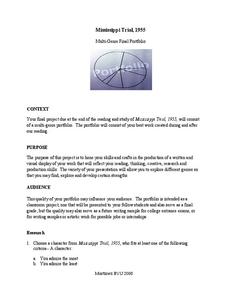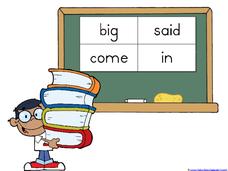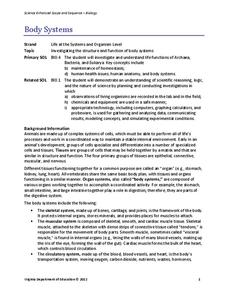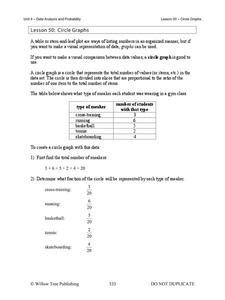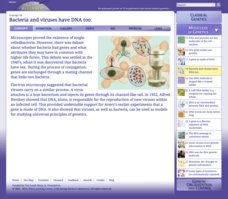Curated OER
Mississippi Trial, 1955: Culminating Writing Project (Multi-Genre Final Portfolio)
Designed as the final project concluding a study of Mississippi Trial, 1955, readers select a character from Crowe's novel and craft a portfolio of six entries that reveal not only aspects of the character, but similarities between the...
Curated OER
Isolation Worksheets
Designed to support learners on the autism spectrum or with Asperger syndrome, these worksheets will help you and your pupils to identify patterns of isolation they may be experiencing in their lives.
1 plus 1 plus 1 equals 1
I Can Read! Sight Words Set #6
Master the sight words big, said, come, and in with a packet of helpful reading activities. Kids work on their reading skills with tracing pages and bingo activities, as well as flash cards, connect-the-dots, and a short word search.
Virginia Department of Education
Body Systems
The human body is an amazing thing! Explore the body with your high school class as they investigate each system in detail. They learn components of each organ system and disease processes that can negatively affect general health and...
Willow Tree
Circle Graphs
Pie isn't just for eating! Scholars learn to create pie charts and circle graphs to represent data. Given raw data, learners determine the percent of the whole for each category and then figure out the degree of the circle that percent...
Virginia Department of Education
Changes in Ecosystems
How does water pollution affect the environment? Provide your class with the resources to answer this question as they learn about eutrophication and ecosystem changes. Over two weeks, they simulate the effects of pollution on the...
Chicago Botanic Garden
Nature Walk and Ecosystem Introduction
A food web has no organism higher than a tertiary consumer because there wouldn't be enough energy left to sustain them. The fourth installment in a seven-part series begins with a nature walk to get pupils thinking about their...
Chicago Botanic Garden
Food for Thought: Climate Change and Trophic Cascades
Learners examines the arctic food web with a short video about polar bears and an article about bears and warming temperatures. They design an arctic food web and discuss the trophic cascade that could come from climate change.
National Wildlife Federation
The Amazing Adventures of Carbon: How Carbon Cycles through the Earth
Here's a stat for your pupils: 18 percent of the human body is carbon! Part 10 in the series of 12 takes pairs on an adventure through the carbon cycle. After a class reading about carbon, pairs read and choose their own adventure...
Royal Society of Chemistry
Hazard Symbols
Starting in 2015, all chemicals must have a pictogram of the associated chemical hazards. A brain-building activity reviews four of the basic symbols found in a typical science laboratory. Through a fun puzzle, scholars apply their...
College Board
AP® Psychology Cognition and Language
I can remember what happened five years ago, but I can't recall what I did last week! High school psychology students analyze how memory, cognition, and language impact one another. Hands-on activities, memory exercises, and research...
Orlando Shakes
Into The Woods: Study Guide
Fans of musical theater may know the title tune of Into the Woods well, but do they know what the show is all about? A study guide provides information about the classic musical, including details about the characters and a summary of...
Perfection Learning
I Know Why the Caged Bird Sings
A revolutionary work of literature requires a revolutionary assessment project. A series of activities on Maya Angelou's I Know Why the Caged Bird Sings includes discussion questions, a plot synopsis, and a selection of both short and...
Creative Visions Foundation
Video Interpretations of the UDHR
How can people better understand their rights? Scholars explore the question with the second of four installments in the Introduction to the Universal Declaration of Human Rights lesson plan series. Learners watch and write descriptions...
Council for Economic Education
What's the Big Deal about Spices?
Today's gourmands don't consider spices to be the equivalent of silver and gold. During the middle ages, however, these commodities were precious. People back then used spices in religious ceremonies, to cure rotten food, and as a show...
Cold Spring Harbor Laboratory
RNA Is an Intermediary Between DNA and Protein
For years, scientists believed tRNA was junk left over from larger RNA. Three scientists used different approaches to prove tRNA actually exists as the connection between DNA and protein. Learn about their experiments, their lives, and...
Cold Spring Harbor Laboratory
Bacteria and Viruses Have DNA Too
In the 1940s, scientists discovered bacteria conjugation, the process of DNA transfer or bacterial sex. The discovery proved that bacteria and viruses contain DNA and led to a Nobel prize. Interested individuals learn about the...
Cold Spring Harbor Laboratory
DNA Responds to Signals from Outside the Cell
How do cells know when to replicate, transcribe, and stop? James E. Darnell, Jr. shifted from studying medicine to biochemistry and decided to address this mystery. Learn about his research, discoveries, and the impact on future medical...
Cold Spring Harbor Laboratory
Development Balances Cell Growth and Death
Cells demonstrate a life cycle like other living things, but what if death was no longer part of the cycle? Learn about the important balance requiring death to continue functioning. An online interactive introduces a group of scientists...
Cold Spring Harbor Laboratory
Some Types of Mutations Are Automatically Repaired
Does natural light damage or repair DNA? Learn the answer discover the scientists who researched the topic with an online interactive. Scholars read through an online animation presenting the content at their own pace. Then, they read...
EngageNY
Launching Researching: Reading for Gist and Gathering Evidence Using the Research Guide
Let's get to the gist! Pupils work in research teams to gather information about specific refugee experiences from Bosnia, Afghanistan, and Kurdistan. Scholars then try to find the gist of informational texts about their topics,...
EngageNY
Performance Task: Two-Voice Poem Readings
Eye contact, volume, and pronunciation are key ingredients to a successful presentation. Pupils present their two-voice poems to the class with their poetry reading partners. Next, to wrap up the unit, scholars use a worksheet to reflect...
EngageNY
Writing to Show, Not Tell: Dialogue, Sensory Words, and Strong Action Verbs
Consume, gobble, devour ... serving up strong verbs! Writers focus on using dialogue, strong action verbs, and sensory details in their writing. After analyzing a model narrative, they apply their learning to their own hero's journey...
EngageNY
Mid-Unit Assessment: Analyzing Visual Elements in a Graphic Novel
Can I get a visual? Scholars work on their mid-unit assessments by analyzing vocabulary and discussing visual elements in Investigating the Scientific Method with Max
Axiom Super Scientist. They then reflect on their learning by...
Other popular searches
- Learning Styles Inventory
- Identifying Learning Styles
- Learning Styles Lesson Plans
- Learning Style Inventory
- Determine Learning Styles
- Identify Learning Styles
- Learning Styles Quiz
- Learning Styles Activity
- Test for Learning Styles
- Learning Styles Children
- Learning Style Quiz
- Learning Styles Math Lessons


